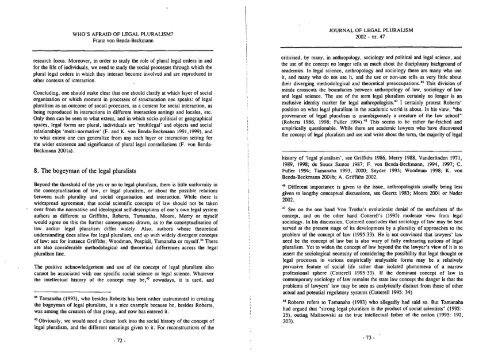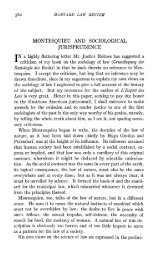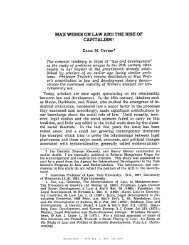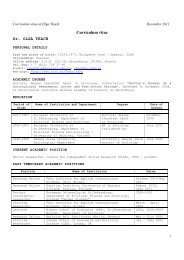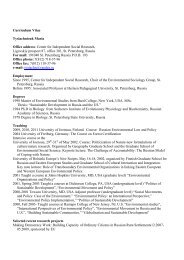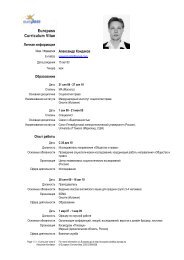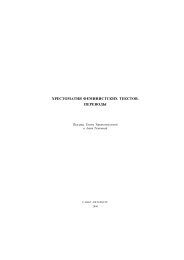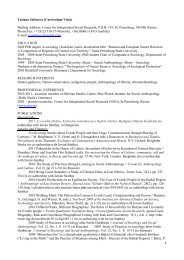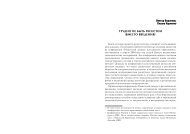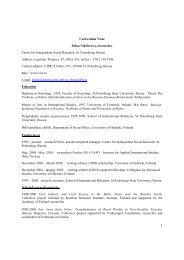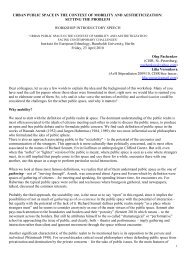who's afraid of legal pluralism?
who's afraid of legal pluralism?
who's afraid of legal pluralism?
You also want an ePaper? Increase the reach of your titles
YUMPU automatically turns print PDFs into web optimized ePapers that Google loves.
WHO'S AFRAlO OF LEGAL PLURALlSM?Franz von Benda-BeckmannJOURNAL OF LEGAL PLURALlSM2002 - nro 47research focuso Moreover, in order to study the role <strong>of</strong> plural <strong>legal</strong> orders in andfor the Iife <strong>of</strong> individuals, we need 10 sludy the social processes through which theplural <strong>legal</strong> orders in which they interact become involved and are reproduced inolher contexlS <strong>of</strong> interaction.Concluding, one should make c1ear that one should clarify at which layer <strong>of</strong> socialorganisation or which moment in processes <strong>of</strong> structuralion one speaks: <strong>of</strong> <strong>legal</strong><strong>pluralism</strong> as an outcome <strong>of</strong> social processes, as a context for social interaction, asbeing reproduced in interactions in different interaction settings and locales, etc.Only then can be seen to what extem, and in which socio-political or geographicalspaces, <strong>legal</strong> forms are plural, individuals are 'multi<strong>legal</strong>' and objects and socialrelationships 'multi-normatíve' (Fo and K. von Benda-Beckmann 1991,1999), andto what extem one can generalize from any such layer or interaction setting forthe wider existence and significance <strong>of</strong> plural <strong>legal</strong> constellations (F. von BendaBeckmann 200Ia).8. The bogeyrnan <strong>of</strong> the <strong>legal</strong> pluralistsBeyond the threshold <strong>of</strong> the yes or no to <strong>legal</strong> <strong>pluralism</strong>, there is li!tle uniformity inthe conceptualisation <strong>of</strong> law, or <strong>legal</strong> <strong>pluralism</strong>, or about the possible reJationsbetween such plurality and social organisation and interaction. While there iswidespread agreement, that social scientific concepts <strong>of</strong> law shOl~ld nol be takenover from the normative and ideological self-descriptions <strong>of</strong> one's own <strong>legal</strong> systemauthors as different as Griffiths, Roberts, Tamanaha, Moore, Merry or myselfwould agree on this the further consequences drawn, as to the conceptualisation <strong>of</strong>law and/or <strong>legal</strong> <strong>pluralism</strong> differ widelyo AIso, authors whose theoreticalunderstanding does allow for <strong>legal</strong> <strong>pluralism</strong>, end up with widely divergent concepts<strong>of</strong> law: see for instance Griffiths, Woodman, Pospisil, Tamanaha or myself. 44 Thereare also considerable methodologicaI and theoretical differences across the <strong>legal</strong><strong>pluralism</strong> lineoThe positive acknowledgement and use <strong>of</strong> the concept <strong>of</strong> <strong>legal</strong> <strong>pluralism</strong> alsocannot be associated with one specific social science or <strong>legal</strong> science. Whateverthe intellectual history <strong>of</strong> the concept may be,45 nowadays, it is used, and44 Tamanaha (1993), who besides Roberts has been rather instrumental in creatingthe bogeyman <strong>of</strong> <strong>legal</strong> pluralists, is a nice example because he, besides Roberts,was among the creators <strong>of</strong> that group, and ,now has entered il.45 Obviously, we would need a closer look into the social history <strong>of</strong> the concept <strong>of</strong><strong>legal</strong> <strong>pluralism</strong>, and the different meanings given to il. For reconstructions <strong>of</strong> the-72criticised, by many, in anthropology, sociology and politica! and lega! science, andthe use <strong>of</strong> the concept no longer tells us much about the disciplinary background <strong>of</strong>academicso In <strong>legal</strong> science, anthropology and sociology there are many who usejt, and many who do not use it, and the use or non-use tells us very Httle abouttheir diverging methodological and theoretical preoccupations. 46 This division <strong>of</strong>minds crosscuts the boundaries between anthropology <strong>of</strong> law, sociology <strong>of</strong> lawand <strong>legal</strong> scienceo The use <strong>of</strong> the term lega! <strong>pluralism</strong> certainIy no longer is anexclusive identity marker for <strong>legal</strong> anthropologists. 47 I certainly protest Roberts'position on what <strong>legal</strong> <strong>pluralism</strong> in the academic world is about. In his view, "lheprovenance <strong>of</strong> <strong>legal</strong> <strong>pluralism</strong> is unambiguously a creature <strong>of</strong> lhe law school"(Roberts 1986, 1998; Fuller 1994).48 This seems to be rather far-fetched andempirically questionableo While there are academic lawyers who have discoveredlhe concept <strong>of</strong> <strong>legal</strong> plura1ism and use and wrile aboul lhe term, the majority <strong>of</strong> <strong>legal</strong>history <strong>of</strong> '<strong>legal</strong> <strong>pluralism</strong>', see Griffiths 1986, Merry 1988, Vanderlinden 1971,1989, 1998; de Sousa Santos 1987; F. von Benda-Beckmann, 1994, 1997; C.Fuller 1994; Tamanaha 1993, 2000; Snyder 1993; Woodman 1998; Ko vonBenda-Beckmann 2001b; Ao Griffiths 2002046 Different importance is given lo the issue, anlhropologisls usuallybeing lessgiven to lengthy conceptual discussions, see Geertz 1983; Moore 2001 or Nader2002.47 See on the one hand Von Trotha's evolutionist denial <strong>of</strong> the usefulness <strong>of</strong> theconcept, and on the other hand Cotterell's (1995) moderate view from <strong>legal</strong>sociologyo In his discussion, COlterell concludes that sociology <strong>of</strong> law may be bestserved at the present stage <strong>of</strong> its development by a plurality <strong>of</strong> approaches lO theproblem <strong>of</strong> the concept <strong>of</strong> law (1995:33). He is not convinced that lawyers' lawneed be the concept <strong>of</strong> law but is also wary <strong>of</strong> fulIy embracing nOlions <strong>of</strong> <strong>legal</strong><strong>pluralism</strong>o Yet to widen the concept <strong>of</strong> law beyond the lhe lawyer's view <strong>of</strong> it is toassert the sociological necessity <strong>of</strong> considering the possibility thal <strong>legal</strong> thought or<strong>legal</strong> processes in various empiricalIy analysable forms may be a relativelypervasive fealute <strong>of</strong> social life rather than isolated phenomena <strong>of</strong> a narrowpr<strong>of</strong>essional sphere (Cotterell 1995:33). If the dominant concept <strong>of</strong> law incontemporary sociology <strong>of</strong> law remains the state law concept the danger is that theproblems <strong>of</strong> lawyers' law may be seen as analytically distinct from those <strong>of</strong> otheractual and potential regulatory systems (Cotterell 1995: 34)48 Roberts refers to Tamanaha (1993) who allegedly had said sOo But Tamanahahad argued that "strong <strong>legal</strong> <strong>pluralism</strong> is the product <strong>of</strong> social scientists" (1992;25), oUling Malinowski as the tme intellectual father <strong>of</strong> the notion (1993: 192,203).- 73


